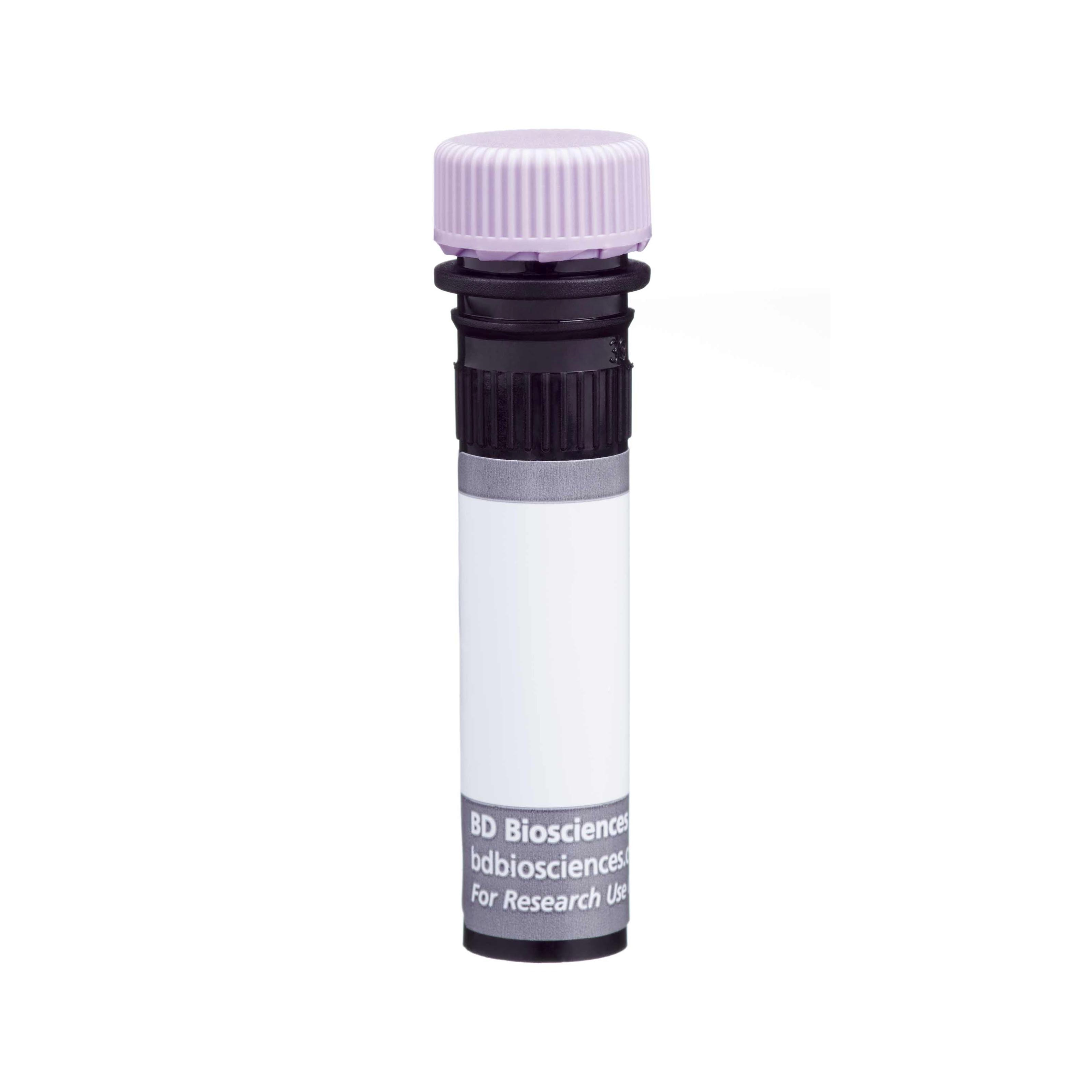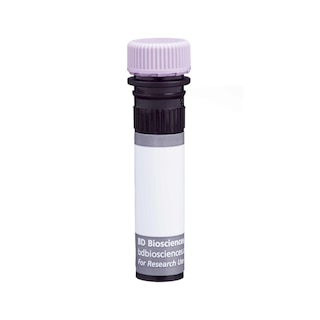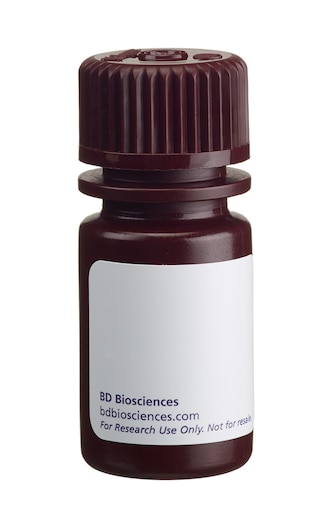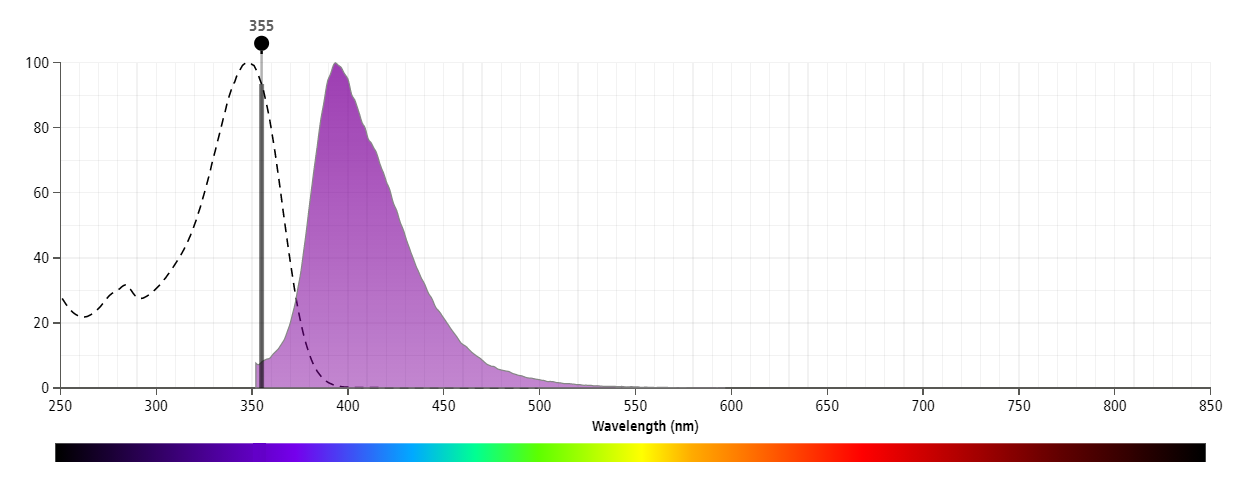Old Browser
This page has been recently translated and is available in French now.
Looks like you're visiting us from {countryName}.
Would you like to stay on the current country site or be switched to your country?




Flow cytometric analysis of CD25 expression on unstimulated (Left Plots) and activated (Right Plot) human lymphocytes. Left Plots Whole blood was stained with APC Mouse Anti-Human CD4 antibody (Cat. No. 555349/561840/561841) and with either BD Horizon™ BUV395 Mouse IgG1, κ Isotype Control (Cat. No. 563547) or BD Horizon™ BUV395 Mouse Anti-Human CD25 antibody (Cat. No. 567483/567484) as indicated. The erythrocytes were lysed with BD FACS™ Lysing Solution (Cat. No. 349202). The bivariate pseudocolor density plot showing the correlated expression of CD25 (or Ig Isotype control staining) versus CD4 was derived from gated events with the forward and side light-scatter characteristics of viable lymphocytes. Right Plot Peripheral blood mononuclear cells were stimulated for 3 days with Phytohemagglutinin (PHA) and then stained with either BD Horizon™ BUV395 Mouse IgG1, κ Isotype Control (Cat. No. 563547; dashed line histogram) or BD Horizon™ BUV395 Mouse Anti-Human CD25 antibody (Cat. No. 567483/567484; solid line histogram). BD Via-Probe™ Cell Viability 7-AAD Solution (Cat. No. 555815/555816) was added to cells right before analysis. The fluorescence histogram showing CD25 expression (or Ig Isotype control staining) was derived from gated events with the forward and side light-scatter characteristics of viable (7AAD-negative) lymphoblasts. Flow cytometry and data analysis were performed using a BD LSRFortessa™ X-20 Cell Analyzer System and FlowJo™ software.


BD Horizon™ BUV395 Mouse Anti-Human CD25

Regulatory Status Legend
Any use of products other than the permitted use without the express written authorization of Becton, Dickinson and Company is strictly prohibited.
Preparation And Storage
Recommended Assay Procedures
BD® CompBeads can be used as surrogates to assess fluorescence spillover (Compensation). When fluorochrome-conjugated antibodies are bound to BD® CompBeads, they have spectral properties very similar to cells. However, for some fluorochromes there can be small differences in spectral emissions compared to cells, resulting in spillover values that differ when compared to biological controls. It is strongly recommended that when using a reagent for the first time, users compare the spillover on cells and BD® CompBeads. This will ensure that BD® CompBeads are appropriate for your specific cellular application.
For optimal and reproducible results, BD Horizon Brilliant™ Stain Buffer should be used anytime BD Horizon Brilliant™ dyes are used in a multicolor flow cytometry panel. Fluorescent dye interactions may cause staining artifacts which may affect data interpretation. The BD Horizon Brilliant™ Stain Buffer was designed to minimize these interactions. When BD Horizon Brilliant™ Stain Buffer is used in in the multicolor panel, it should also be used in the corresponding compensation controls for all dyes to achieve the most accurate compensation. For the most accurate compensation, compensation controls created with either cells or beads should be exposed to BD Horizon Brilliant™ Stain Buffer for the same length of time as the corresponding multicolor panel. More information can be found in the Technical Data Sheet of the BD Horizon Brilliant™ Stain Buffer (Cat. No. 563794/566349) or the BD Horizon Brilliant™ Stain Buffer Plus (Cat. No. 566385).
Product Notices
- Please refer to www.bdbiosciences.com/us/s/resources for technical protocols.
- Source of all serum proteins is from USDA inspected abattoirs located in the United States.
- Caution: Sodium azide yields highly toxic hydrazoic acid under acidic conditions. Dilute azide compounds in running water before discarding to avoid accumulation of potentially explosive deposits in plumbing.
- This reagent has been pre-diluted for use at the recommended Volume per Test. We typically use 1 × 10^6 cells in a 100-µl experimental sample (a test).
- For fluorochrome spectra and suitable instrument settings, please refer to our Multicolor Flow Cytometry web page at www.bdbiosciences.com/colors.
- An isotype control should be used at the same concentration as the antibody of interest.
- BD Horizon Brilliant Ultraviolet 395 is covered by one or more of the following US patents: 8,158,444; 8,575,303; 8,354,239.
- BD Horizon Brilliant Stain Buffer is covered by one or more of the following US patents: 8,110,673; 8,158,444; 8,575,303; 8,354,239.
- Please refer to http://regdocs.bd.com to access safety data sheets (SDS).
Companion Products






The BC96 monoclonal antibody specifically binds to human CD25, the low-affinity alpha subunit of the Interleukin-2 Receptor (IL-2Rα), which is also known as TAC antigen. IL2RA encodes CD25 which is a 55 kDa type I transmembrane glycoprotein comprised of an extracellular region with two Complement Control Protein domains (CCP) followed by a transmembrane region and a short cytoplasmic tail. CD25 is constitutively expressed at high levels on natural T regulatory cells and variably expressed on conventional T cells and B cells and their precursors, NK cells, monocytes, and macrophages. CD25 expression can be highly upregulated upon antigenic or mitogenic stimulation of T cells or B cells. A soluble form of CD25 is found in biological fluids due to proteolytic cleavage of the extracellular region of transmembrane CD25. CD25 noncovalently associates with CD122 (IL-2Rβ chain) and CD132 (IL-2Rγ, also known as the common γ chain or γc) to form the high-affinity signal-transducing IL-2R complex (IL-2Rαβγ). This heterotrimeric receptor mediates biological activities of IL-2 which can act as a cellular activation, growth, and differentiation factor and regulator of cell viability. Analysis of CD25 expression can be used to characterize the nature of normal leucocytes in their resting states or activated during inflammatory or immune responses as well as those present in certain disease states.
The antibody was conjugated to BD Horizon BUV395 which has been exclusively developed by BD Biosciences as an optimal dye for use on a 355 nm laser equipped instrument. With an Ex Max at 348 nm and an Em Max at 395 nm, this dye has virtually no spillover into any other detector. BD Horizon BUV395 can be excited with a 355 nm laser and detected with a 379/28 filter.

Development References (4)
-
Chapel A, Bensussan A, Vilmer E, Dormont D. Differential human immunodeficiency virus expression in CD4+ cloned lymphocytes: from viral latency to replication.. J Virol. 1992; 66(6):3966-70. (Immunogen: Flow cytometry). View Reference
-
Knapp W. W. Knapp .. et al., ed. Leucocyte typing IV : white cell differentiation antigens. Oxford New York: Oxford University Press; 1989:1-1182.
-
Poszepczynska E, Bagot M, Echchakir H, et al. Functional characterization of an IL-7-dependent CD4(+)CD8alphaalpha(+) Th3-type malignant cell line derived from a patient with a cutaneous T-cell lymphoma.. 2000; 96(3):1056-63. (Clone-specific). View Reference
-
Schlossman SF. Stuart F. Schlossman .. et al., ed. Leucocyte typing V : white cell differentiation antigens : proceedings of the fifth international workshop and conference held in Boston, USA, 3-7 November, 1993. Oxford: Oxford University Press; 1995.
Please refer to Support Documents for Quality Certificates
Global - Refer to manufacturer's instructions for use and related User Manuals and Technical data sheets before using this products as described
Comparisons, where applicable, are made against older BD Technology, manual methods or are general performance claims. Comparisons are not made against non-BD technologies, unless otherwise noted.
For Research Use Only. Not for use in diagnostic or therapeutic procedures.
Report a Site Issue
This form is intended to help us improve our website experience. For other support, please visit our Contact Us page.